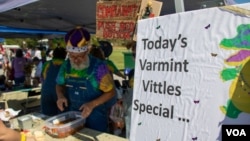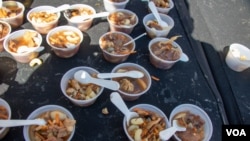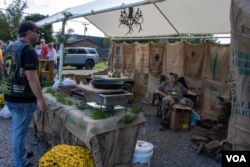Would you like to try turtle soup? How about a thicker, richer-tasting gumbo made with alligator meat? Or perhaps you would like a helping of chili made with bear meat.
Foods like these might sound very appealing to some Americans, but not everyone. They were just a few of the unusual foods available at the West Virginia Roadkill Cook-off. The cook-off festival takes place each year in Pocahontas County, West Virginia.
Since 1991, the event has been held in the Appalachian Mountains in the small town of Marlinton. The cook-off is a celebration of food dishes Americans normally do not find in a restaurant. All the dishes are made with roadkill, meaning animals found on the side of the road after being struck by a car or truck.
Anyone can sign up to prepare food for the event. But at least 25 percent of the meat must be “wild,” meaning it came from either hunting or killing an animal, and not from a store.
This year, some of the dishes had names like “Drunken Deer in the Headlights” and “Hillbilly Mardi Gras Alligator and Turtle Gumbo.”
Part of Appalachian Culture
Ben Wilfong is vice president of the Pocahontas County Chamber of Commerce, the organization that finances the roadkill cook-off. He says the event started as simply an autumn harvest festival.
“Being Appalachia, and the wild game and history and culture, they decided to start the roadkill cook-off portion,” Wilfong noted. “Its meaning is to cook something that you could possibly find on the side of the road …which is wildlife and part of Appalachian culture.”
Wilfong said that people normally start planning a year before the cook-off to make sure they have enough wild meat. But he said the cooks never know exactly what kind of food they will prepare until a few weeks before the festival, and there are always surprises. In recent years, festival goers have enjoyed meat from pheasant, opossum, snake, and even iguana.
Bill Jordan, president of the chamber of commerce, said the idea for the event came from a book called “West Virginian Roadkill Cook-off.” It was written by a West Virginian named Jeff Everball.
It did not take a long time for the cook-off to become popular.
“Eighty percent of the people here are not local, they are from Oklahoma, Texas, and Kansas,” said Jordan. He added that people from as far away as India and Germany have traveled to Marlinton for the festival. They come for the chance to try out food they have never had before.
While the festival is known as the “roadkill” cook-off, many of the cooks get their meat from hunting or businesses that sell unusual kinds of meats.
Wilfong noted that it is illegal in West Virginia to pick up animals you kill with a vehicle unless one gets approval from the local government. However, that does not mean the festival never has food dishes from actual roadkill.
“One year,” Jordan said, “a guy showed up that morning unregistered with a deer on the back of his truck that he had just hit that morning and wanted to cook it.”
Not just for the food
There is more to the festival than just unusual foods. You can also find hundreds of arts and craft dealers who sell their work. There is also a biscuit baking competition, and even a “Roadkill Queen” beauty competition.
The festival is not just about having a good time either. It is also a money-making event for Marlinton and Pocahontas County.
“It’s close to a $2 million economic impact,” says Wilfong. “The population of Pocahontas County is just slightly over 8,500 people, and they get about 12,000 for the event.”
Wilfong added that the festival provides money for all businesses in the area, such as fuel businesses, hotels, store owners and restaurants.
For local people, it also is a great way to get involved in the community.
Angela Lester and Peggie Stahl, from a group called the Youth Health Service, were taking part for their second time. They made a chili with a combination of venison and bear meat, which won first place at the festival this year.
Lester said they decided to compete as a way to get involved with their community, and because it was a lot of fun.
Lester said they got their bear meat mostly from hunting, “But we’ve all come up on bear that has been hit by a vehicle. I just hit a deer the other day by accident.”
The Roadkill Cook-off festival is held every year on the last weekend of September. Cooking directions for some of the winning dishes from earlier years can be found in the “Roadkill Cookbook,” which can be found on the Pocahontas County website.
I’m Rick Hindman. And I'm Dorothy Gundy.
Phil Dierking reported this story for VOA Learning English. George Grow was the editor.
Write to us in the Comments Section or on our Facebook page.
_______________________________________________________________
Words in This Story
chili - n. a thick mix of meat and chili peppers; a similar product made without meat
gumbo - n. a thick soup containing meat or seafood and usually vegetables
festival - n. a time of celebration; a special observance
impact - n. a major effect
portion - n. a piece or share of something
soup - n. a liquid food often containing pieces of solid food
pick up - v. to take hold of and lift up
biscuit - n. a small bread
We want to hear from you. Write to us in the Comments Section.







